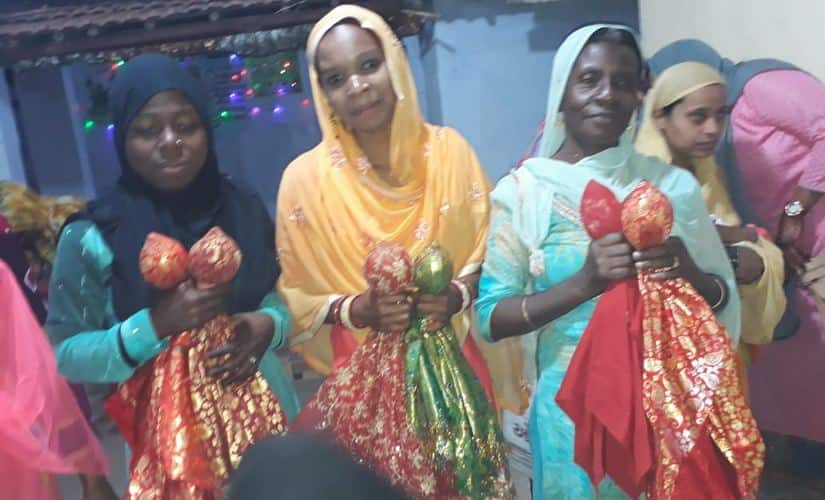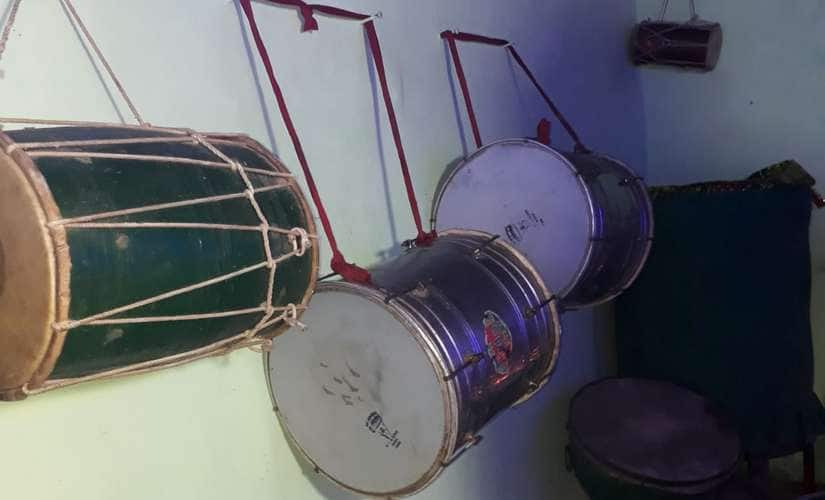Editor’s Note: In this eighteen-part series, we will attempt to address the tropes associated with the communities in question from an Adivasi perspective while also exploring the contemporary relationship of Adivasi citizens with the Indian government. This is the fifteenth article of the series on Adivasi communities in peninsular India.
***
I belong to the Siddi tribe. It is commonly known that we, Siddis, have our origins in Africa and there are many versions about how Siddis migrated to various parts of India. In the medieval times, during the rule of the Ghories (or Ghurids), the Siddis entered India and were appointed to play the drums for Shahbuddin Ghori’s military troupe. According to some Siddis, their forefathers migrated from Arab while many others say they migrated from Abisinia (Ethiopia). While it is true that Siddis were brought to India as slaves, not many people know that we also received royal patronage in some places. For example, we developed our own settlement in Jhanjir Fort in Bombay around the 17th Century and even today, that place is home to many Siddis. The Nawab of Sachin, a city near Surat in Gujarat, was a Siddi. [caption id=“attachment_7350741” align=“alignnone” width=“825”] Dargah of Baba Gor at Ratanpur, Bharuch. Image courtesy: Farida K Al-Mubrik[/caption] My great grandfather, Sidi Mubarak was a faithful guardian of the Kings of Bhavnagar. He served both Raja Bhav Singh and his son Krishna Kumar Singh as their guard and treasurer. The famous Gujarati kathakaar Bhikhudan Gadhavi has written about Sidi Mubarak in his diaro (a form of storytelling). The kings of Bhavanagar provided resources for Sidi Mubarak’s son Umar_bhai_ to study medicine at Aligarh and after his return, Umar_bhai_ served the kings as their doctor. His second son, Abdulla Bin Mubarak was an accountant and served in the court of the kings of Bhavnagar. After the end of the princely states, both the sons devoted themselves to the upliftment of the Siddi people in Bhavnagar through various social and cultural activities. Abdulla even started a Sidi Samachar Patrika as well. The Siddis, due to his history, are known to the people of Bhavnagar as having royal patronage. We, Siddis, take a lot of pride in our religious practices as well. While in parts of Karnataka Siddis follow Hindu and Christian religions, in Gujarat, we follow Sufism. There are two important sites of our pilgrimage in Gujarat where every year, the Siddis of Gujarat and communities from other religions and faith visit and perform rituals. The Dargah of Baba Nagarchi peer in Talala, Junagadh, and the Dargah of Baba Gor in Ratanpur near Bharuch, are very popular sites of pilgrimage which witness elaborate religious ceremonies and dance-music rituals by the Siddis. We are still continuing our music and dance traditions from ancient times. Our dance ‘dhamaal’ is performed on special occasions and during this dance we play mugarama, a musical instrument similar to the drum. The present situation of Siddis in Gujarat While the kings of princely states had shown a lot of respect and generosity to Siddis, the post-independence reality has been of rejection, humiliation and neglect. There are close to 1.5 lakh Siddis in Gujarat. While there are some villages in Junagadh which are completely Siddi, the community people live in scattered settlements in various parts of Gujarat. You’ll find us in Bhavnagar where I live, Jamnagar, Rajkot, Baroda, Surat and Porbandar. [caption id=“attachment_7350691” align=“alignnone” width=“825”]
 Siddi devotees at a Dargah at Khokha, Bhavnagar. Image courtesy: Farida K Al-Mubrik[/caption] Many of us work in temporary jobs, such as painting and construction work. Majority of Siddis have not been able to secure any form of stable employment even though we’ve got a reservation because we have been facing great neglect in education and employment. The Siddis have a reservation under Scheduled Tribes quota, but this is not recognised in many parts of Gujarat which makes it very difficult for youth form the community to pursue decent education or seek employment.
Siddi devotees at a Dargah at Khokha, Bhavnagar. Image courtesy: Farida K Al-Mubrik[/caption] Many of us work in temporary jobs, such as painting and construction work. Majority of Siddis have not been able to secure any form of stable employment even though we’ve got a reservation because we have been facing great neglect in education and employment. The Siddis have a reservation under Scheduled Tribes quota, but this is not recognised in many parts of Gujarat which makes it very difficult for youth form the community to pursue decent education or seek employment.
Even though a lot of policies and provisions appear on paper, when it comes to implementation we find a great sense of hostility. Even the issues of cultural support are disappointing.
We, Siddis, are invited to perform at various functions and festivals by government officers, but there has been no systematic support to ensure the community’s survival through cultural practices. On the one hand, while they find our dance, music and costumes attractive and appealing, and expect us to perform, they are unwilling to provide a decent remuneration to us for the same. Or even provide resources for us to promote or sustain our culture. We are unable to earn a livelihood using our culture. [caption id=“attachment_7350701” align=“alignnone” width=“825”] Siddis performing ‘dhamaal’, a dance form of the community. Image courtesy: Farida K Al-Mubrik[/caption] We, Siddis, are also very good at sports. Many of our youth have won gold medals for their good performances. But there are no sports scholarships or vocational courses for us which can provide us with jobs in sports. It is becoming more and more difficult for our community to find work and livelihood in this state. Siddi land and identity Jambur is a village in Junagadh which is completely Siddi. A few decades back, many families in this village had enough land for habitation and a little agriculture. But in the last few years, almost all of them have lost their land to indebtedness. The Hindus from surrounding villages have slowly managed to wrest control of all the lands from the hands of the Siddis of Jambur. Having been brought up in urban Bhavnagar with the kind of ancestry I’ve mentioned, my take on things was very different till recently. But in present-day Gujarat, being a Muslim and a tribal comes with its own difficulties, especially in rural Gujarat. [caption id=“attachment_7350681” align=“alignnone” width=“825”]
 Mugarama, a traditional musical instrument of Siddi Muslims. Image courtesy: Farida K Al-Mubrik[/caption] Our handwork and devotion to the royalty resulted in us being granted land and this meant we had something to depend upon. Though we are only 70 Siddi families in Bhavnagar, our relationship with the people around us had been cordial, as everybody recognised us for our historical relationship with the royalty. Our Muslim identity didn’t matter to people, and for years, we had had been living peacefully with our neighbours who have been Hindus, Jains and Christians.
Mugarama, a traditional musical instrument of Siddi Muslims. Image courtesy: Farida K Al-Mubrik[/caption] Our handwork and devotion to the royalty resulted in us being granted land and this meant we had something to depend upon. Though we are only 70 Siddi families in Bhavnagar, our relationship with the people around us had been cordial, as everybody recognised us for our historical relationship with the royalty. Our Muslim identity didn’t matter to people, and for years, we had had been living peacefully with our neighbours who have been Hindus, Jains and Christians.
The efforts of painting Siddis as ‘outsiders’ started only after the 2002 Gujarat riots and have become more visible in the past few years.
The right-wing groups in my area have set up ‘Ram Darbar’, a meeting space where amongst other celebrations of Hindu festivals, communally insensitive speeches are given by the organisers to create an atmosphere of fear for us.
One such Ram Darbar is just a few steps away from my house. They regularly make comments about turning the locality into an ‘all-Hindu’ area. This feels very strange because, for years and years, I and my family have been living peacefully with our neighbours who have been Hindus, Jains and Christians.
Of late, I have been receiving open threats from the people, asking me to leave my house immediately or else face consequences. There is constant pressure from the real estate lobby, which comprises of powerful people with political support. While many of my relatives have sold their lands and moved, as we are too small in number to come together or resist, I can never think about leaving this land, which carries memories of my ancestors and their humble living. When I tried to work on the construction on this piece of land, I was tricked by an engineer and have now become a victim of land fraud. I look at this as a part of a larger political conspiracy, to remove Siddis from this part of Bhavnagar. If our family, even after having had land, isn’t able to protect it from those wanting to alienate us, what would be the situation of other Siddis in Gujarat? Most of whom aren’t even able to access decent education for their children or a decent living?
Gujarat is lauded for the work it has done for the tribes who live here. But this is untrue in the case of the Siddis of Gujarat. Nothing has been done to protect us, or to help our situation in Gujarat. Our Muslim identity has only made things worse for us.
[caption id=“attachment_7350711” align=“alignnone” width=“825”] Siddis performing ‘dhamaal’, a dance form of the community. Image courtesy: Farida K Al-Mubrik[/caption] I don’t see anything substantial happening unless there is separate ST quota for the employment for Siddis and separate reservations in University posts. Immediate provisions need to be made to provide free school education to Siddi children and scholarships for higher studies need to be provided for Siddi youth. The government can start by giving loans to Siddi women for small business startups. We expect more sustained cultural collaborations with African countries in order to be able to sustain our culture. This will be encouraging to the Siddi community as a whole, as we are still very rooted in our culture. We also have a specific demand that the administration of Baba Gor Dargah in Ratanpur, Bharuch, be handed over to the Siddi community. At present, its management is controlled by non-Siddi Muslims. There are rental properties attached to the Dargah and ideally, both the administration and the other properties should be handed over to us as the Dargah is of our ancestors. The government should also build a residential school and a sports complex for the Siddi youth as our youth are very talented athletes. And most important of all, our identity as ‘Siddi Muslims’ shouldn’t lead to further victimisation. (Translation by Vasvi Oza)


)

)
)
)
)
)
)
)
)



